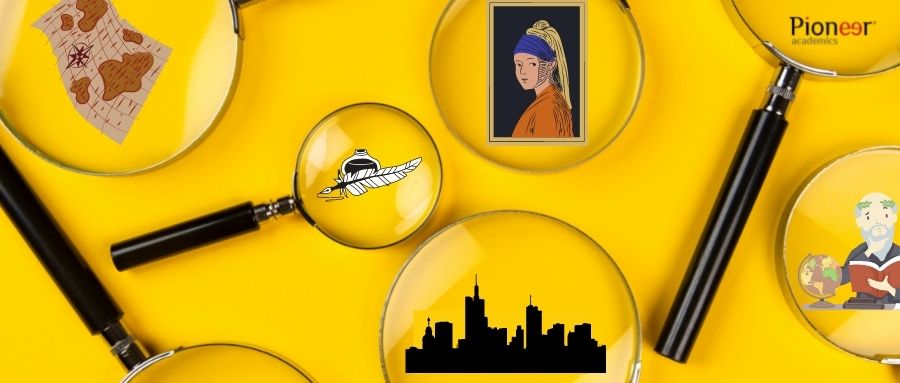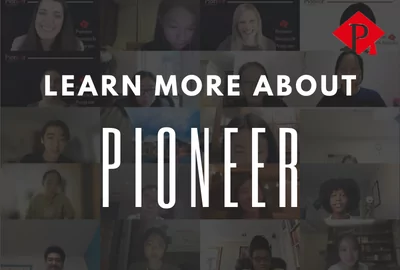While the word “research” brings to mind white lab coats and beakers of chemicals for many, Pioneer scholars in the humanities produce original research in areas such as history, literature, philosophy, and art history/architecture. What humanities research papers at Pioneer have in common is a deep, qualitative analysis of some form of media, be it literature, historical documents, images, film, or architectural structures. Depth of analysis is what allows Pioneer scholars to contribute original, high-quality research; they cannot submit a literature review or a book report. Pioneer’s academic system combines rigorous standards and oversight to ensure quality, original research from all students. Students are required to come up with their own research questions and do not receive a topic from their faculty mentor. This is quite different from humanities assignments that most high school students are used to, which often involve writing an essay in response to a prompt. Pioneer scholars in the humanities hone in on an intentionally narrow focus which allows them to dive deep into a topic and contribute something new.
Historical analysis using documents
Some Pioneer scholars look to archival documents in databases to answer research questions in history. Gayathri (history, 2020), a Pioneer scholar from India, worked with archives to research neutrality and politics in the Olympics. “Because of my research concentration, my methodology was essentially source-based analysis—finding sources and collating information was my first step,” she says. “After collating information from a sufficient number of primary sources such as images or documentaries and films of that time period, [I looked at] recent analytical sources that looked at how politics have transpired at specific Olympic events… My main source was the charter of the Olympics, and its analysis was my essential methodology.”
Allie (history/STS, 2020), a Pioneer scholar from South Korea, researched the introduction of ultrasound technology to Korea and its implications for women’s reproductive rights. “I first looked into the technology behind ultrasound to become more familiar with it in general… Then, the main part of my research process was looking into primary-source newspapers from the era in Korea. I looked into databases that had compilations of newspaper articles from the 1980s and onward, and I read a lot of newspaper articles related to ultrasound technology, gender selective abortion, or the fetus in general to gain an understanding of what the social current was at the time, what gender inequality was at the time, and how ultrasound technology impacted that…. As I read more and more articles, I was able to create a storyline to see how the development of ultrasound progressed through Korean history,”Allie explains.
Deep analysis of a text
For other Pioneer scholars, research takes the form of deep, sustained engagement with one text. Through close-reading and analysis, these scholars make original claims supported by textual evidence. James (philosophy, 2020), a Pioneer scholar from the United States, worked with an excerpt of Renée Descartes’ Meditations. “I focused on one or two chapters of the book and really unpacked them rather than summarizing the entire book. From there, I came up with three strong arguments that formed the structure of my paper,” he explains.
Ruby (literature, 2020), a Pioneer scholar from Taipei, did a close-reading of a short story by Gerald Vizenor. She balanced her own close reading with the work of other literary scholars when writing her research paper. “We had to sort of argue with different critics on his prose. I read different critics on his work in general and the particular short story. I had to balance their ideas with my ideas about the story. If I thought my argument was better I had to show close reading evidence, and if I agreed I had to show my reasons why,” she says. Ruby explains that Vizenor, a postmodern Native American writer, employs labyrinth-like prose that mimics the layered process of oral storytelling. “I tried to do that for my paper, too. I tried to bring the reader in to understand what the maze is,” she says, “I really wanted the paper to mimic his beautiful language, which I attempted to write in a more artistic way so it would be more engaging to the reader and reflect his prose.”
Content/media analysis
Content analysis refers to the qualitative study of documents and media. For some students, content analysis is an invaluable research methodology. Melody (film studies, 2020), a Pioneer scholar from the United States, analyzed the portrayal of autism in film. After narrowing her subject down to just a few films that she could analyze deeply, she laid out a comparison of positive and negative portrayals of autism in film. She then put her own content analysis in conversation with other academic research papers. “I used tidbits of [other research papers about the portrayal of mental illness in film] and combined them with my own ideas. A lot of times I didn’t agree with what the paper was saying, but I would use it as a starting point for what I wanted to say,” she explains.
Angel (history/STS, 2020), a Pioneer scholar from China, analyzed media in the form of blog posts and news articles to answer her research question about how patients and their families feel about the use of medical technologies in schizophrenia diagnosis. “I searched for primary sources like blogs and some newspaper articles, and some posts on activist websites,” she says. Her analysis of these documents provided a window into the firsthand experience of schizophrenia patients who had undergone testing with MRI/fMRI technology. She was able to evaluate their subjective experiences and whether they felt the technology was helpful or harmful to their treatment.
Analysis of a physical space
For Pioneer scholars in the art history/architecture research area, the object of analysis is a physical space. Maged (art history/architecture, 2020), a Pioneer scholar from Egypt, compared Coptic and Byzantine churches. “My paper is structured as a comparison between two different architectural styles in two different cultures. The methodology I used was to take a structure from one culture and a structure from another culture and start building a comparison between them. Out of this comparison, I drew conclusions about why they are different. My question was about the early Byzantine church and the Coptic Church in Egypt and why they are different architecturally and how different they are. I started analyzing structures from the Byzantine church and structures from the Egyptian Coptic Church. In the end, I concluded that differences in practices were responsible for differences in architectural style and the interior of the churches,” he explains.
Nermine (art history/architecture, 2020), a Pioneer scholar from Tunisia, analyzed the work of Iraqi architect Zaha Hadid. “I was trying to answer how Zaha Hadid can design with a very different style of architecture but still give her designs context and make her buildings resemble other buildings. If you compare her buildings to more standard buildings, you will see a huge difference, and yet she still gives meaning to her buildings and they fit into the context of the neighborhood. I compared two of her buildings, one in New York and another one in Milan. I analyzed how the colors and materials she used in the building in New York flow with the neighborhood,” Nermine explains. As sources, Nermine used her own observations and analysis of Hadid’s designs, while also referencing the work of other scholars.
Other methodologies
Pioneer scholars are not limited to any specific research methodologies, and the above examples are far from comprehensive. Molly (philosophy, 2020), a Pioneer scholar from the United States, chose to apply a concept in philosophy to a social issue that was important to her. Using Plato’s criteria for what makes a good parent, Molly examined child abuse through a philosophical lens and shed light on its possible effects. “Plato had three criteria for what makes a good parent, so I used each of those three criteria as a subsection of my paper and put the information where it belonged in each section. In my conclusion, I didn’t exactly make an argument. I didn’t say ‘abusive parents are bad’ because I felt that though my research was a step in highlighting the negative effects of abusive parenting, I didn’t want it to be viewed as something that was set in stone. My conclusion left an opening for interpretation and further research. At this point, I went back to my introduction and summarized the main points that I made in my body paragraphs, and I also incorporated a short blurb about why this research was important,” she explains.
Andrew (history, 2020), a Pioneer scholar from the United States, decided to compare and contrast the artistic and social movement of futurism with Chrisitan thought. Once he decided on a topic, his professor was helpful in directing him to useful books and articles. “I used the sources and interpreted them in my own way, trying to see the perspective of those writers and how they portrayed Christianity and futurism. Then I organized those thoughts into my paper,” Andrew says.
Just like in any other research area, the process of conducting research in the humanities begins with zeroing in on a narrow and interesting question. Pioneer scholars in the humanities sharpen their critical reasoning through deep analysis and prolonged engagement with their source material. In the end, they produce an original paper that contributes to larger academic conversations.




 Doing research is commonplace.
Doing research is commonplace.


